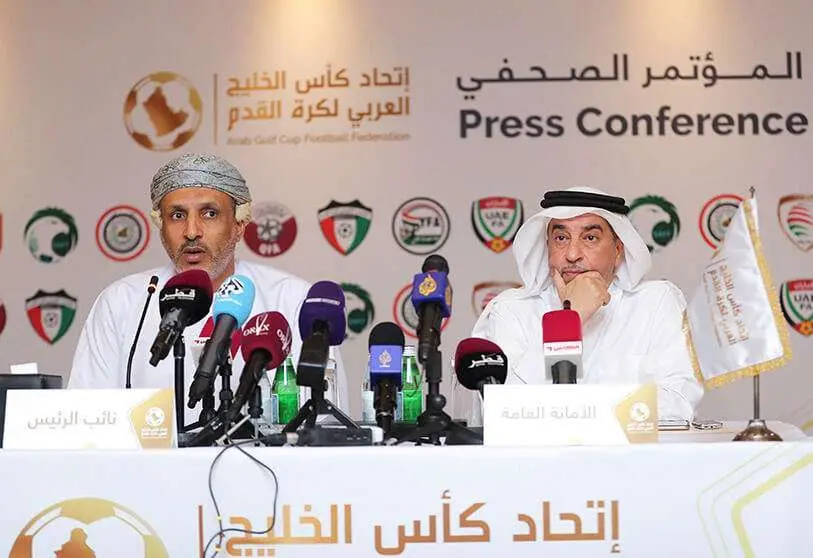FIFA backs 2021 Arab Cup which will see automatic offside for the first time

The 60,000-capacity Al-Bayt Stadium in the municipality of Jor in Qatar will be the first stadium to host the new format of the Arab Cup, which FIFA has supported since its inception in 1963.
The Confederations Cup is a thing of the past and now FIFA is turning to the Arab countries to stage its most cherished tournaments. If the Qatar 2022 World Cup marked a change of direction for world football's governing body, the Arab Cup is the perfect prelude to the spectacular stadiums that are generating so much controversy over the safety of the workers.
It is the tenth edition of a tournament contested by teams from the Maghreb and Middle East. Iraq dominates the trophy cabinet with four titles; Saudi Arabia has two and with one each are Egypt, Tunisia and the reigning 2012 champions, Morocco. The 1982 Lebanon War prevented it from being held and a lack of sponsors also prevented the Cup from being held in 2009, although it has never been a regular event. It was even renamed the Palestine Cup of Nations between 1972 and 1975.
What FIFA wants to achieve this year is that the stadiums of the World Cup in Qatar can be tested with an official competition because most of them are new venues that would not start operating until November 2022.

Within the state of Qatar, there will be stadiums in the aforementioned municipality of Jor; in the municipality of Al-Wakrah with the 40,000-seater Al-Janoub Stadium and in the municipality of Al-Daayen where the 94,500-capacity Lusail Iconic Stadium is located, but which will not be available for the Arab Cup. In Doha there is the 974 Stadium, the most sustainable stadium in the world which will be dismantled after the World Cup and its parts donated to underdeveloped countries; the 69,000-seater Al-Thumama Stadium; in the municipality of Rayan within the Doha area there is the Qatar Foundation Stadium with a capacity of 45,350; the 50,000-seater Khalifa International Stadium and the 44,700-seater Ahmed bin Ali Stadium.
Of the 23 teams in the run-up to the 2022 World Cup, there is a group of favourites on paper comprising Qatar, Tunisia, Algeria and Morocco. One rung lower are Egypt, Saudi Arabia, Iraq and the United Arab Emirates. The rest are more modest teams such as Lebanon, Sudan, Jordan, Palestine, Syria, Mauritania, Oman and Bahrain.
From Group A, Qatar, the hosts of the 2021 Arab Cup and the 2022 World Cup, stand out. The team has been coached by Catalan Félix Sánchez Baus since 2017, although his time in the country began in 2006 when he arrived at the Aspire Academy. The Qatari team played in the Gold Cup in July 2021 with a great performance, losing in the semi-finals to the United States. Since then things have not gone so well and they have lost several times to European teams such as Portugal, Ireland and Serbia.
In group B, Tunisia stands out as one of the favourites for the title because many of its players play for French or English teams, as is the case of Hannibal Mejbri, the 18-year-old who plays for Manchester City. However, for this tournament, many teams do not commit to the big European teams and do without important players.

In Group C, Morocco and Saudi Arabia look set to be the teams to advance to the next round. Halilhodzic's team are improving their football exponentially after investing in the youth system and in great players who have arrived in European teams such as Bono or En-Nesiry (Sevilla), Achraf (PSG) or Ziyech (Chelsea) although everything indicates that it will be a combination of local players who will go to the Arab Cup since in January they will play in the African Cup of Nations, a more important tournament for the interests of the country.
In the case of Saudi Arabia, they are leaving everything in the hands of the younger players as most of them are from the U-23s and some from the senior team who have just made their debut. Hervé Renard will not be on the bench and an assistant will be in charge of the sons of the desert. They are trying to use the tournament to help the players grow with a view to next summer's championships and, above all, to focus their interests on qualifying for the World Cup in Qatar, where their rivals for a place at the event will be Oman, Japan, China and Australia in a group they are leading.
In Group D Algeria will also have a squad that will be without players from Europe's top leagues such as captain Riyad Mahrez of Manchester City. Carlos Queiroz's Egypt team will also be without Liverpool star Mohamed Salah and other Premier League players who are also targeting the 2022 Africa Cup of Nations.
The tournament loses importance because there are no European teams and the big stars of the other teams cannot leave their competition. One of the reasons that has prompted FIFA to test changes to VAR with the implementation of automatic offside. In six stadiums there will be an Artificial Intelligence system that will send an instant message to the VAR when a player is offside, although it will then be up to the referee to decide whether or not to interfere with the play.








